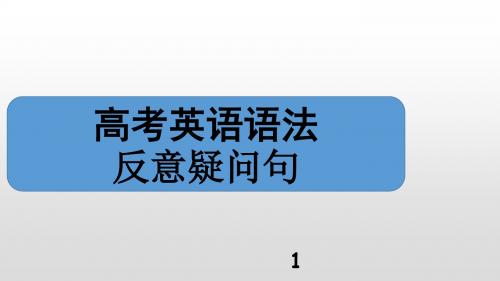反意问句语法课件
合集下载
高考英语语法——反意疑问句(共11张PPT)

9
当陈述句部分含有主从复合句时,附加部分的代词和助动词 须与主句中的主谓保持一致。
You needn't do it since he has finished it, need you? It's the second time that you have sung that song, isn't it?
ome, shall we?
Let us go home, will you?
Open the door, will you?
5
need和dare既可以用作情态动词,又可以用作行为动词,所以在反意疑 问句中要准确判断其是情态动词还是行为动词。
He needn’t do it again, need he? He doesn’t need to do it again, does he? She dare say it, daren’t she? She doesn’t dare to say it, does she?
2
构成
The car is your father's, The girl doesn't sleep, The doctor can help you,
陈述句
isn't it? does she? can't he?
反意疑问句
be动词/情态动词/助动词 (not)+主语(代词)
3
前肯后否 前否后肯
He thinks that it will rain tomorrow, doesn't he? I think that it will rain tomorrow, won't it? They don't suppose that the film is moving, do they?
当陈述句部分含有主从复合句时,附加部分的代词和助动词 须与主句中的主谓保持一致。
You needn't do it since he has finished it, need you? It's the second time that you have sung that song, isn't it?
ome, shall we?
Let us go home, will you?
Open the door, will you?
5
need和dare既可以用作情态动词,又可以用作行为动词,所以在反意疑 问句中要准确判断其是情态动词还是行为动词。
He needn’t do it again, need he? He doesn’t need to do it again, does he? She dare say it, daren’t she? She doesn’t dare to say it, does she?
2
构成
The car is your father's, The girl doesn't sleep, The doctor can help you,
陈述句
isn't it? does she? can't he?
反意疑问句
be动词/情态动词/助动词 (not)+主语(代词)
3
前肯后否 前否后肯
He thinks that it will rain tomorrow, doesn't he? I think that it will rain tomorrow, won't it? They don't suppose that the film is moving, do they?
经典:反意疑问句-精品课件

1 Tom can swim very well, _c_a_n__’t_h_e___? 2 Your parents can’t swim, __c_a_n_t_h_e_y____? 3 All of your friends will come to your party, _w__o_n_’t_t_h_e_y__? 4 They won’t come,_w_i_ll_t_h_e_y__?
6. 当陈述部分有never,seldom(很少), hardly(几乎 不),few,little,nothing(没有) 等否定意义的词时, 后面的反意疑问句则为肯定形式
1.They have never visited his home, h_a_v_e th_e_y__ ? 2.There are few apples in the basket,_a_r_e t_h_e_r_e? 3.He can hardly swim,__c_a_n__h_e__? 4.It has no legs,___d_o_e_s__it___? 5.There is little water in the glass,_i_s__th_e_r_e__? 6.They seldom很少 come late,__d_o__ t_h_e_y__?
5. There be 句型的反意疑问句
There is/are/will be…, isn’t/aren’t/won’t there?
1 There is a pen on the chair,__is_n_’t_t_h_e_re___? 2 There are 60 students in our class, __a_re_n_’_t _th_e_re____? 3 There was nothing in the fridge,___w__as__th_e_r_e___? 4 There will be a paper factory near my home in about 2 years,_w_o_n_’_t _th_e_r_e_?
6. 当陈述部分有never,seldom(很少), hardly(几乎 不),few,little,nothing(没有) 等否定意义的词时, 后面的反意疑问句则为肯定形式
1.They have never visited his home, h_a_v_e th_e_y__ ? 2.There are few apples in the basket,_a_r_e t_h_e_r_e? 3.He can hardly swim,__c_a_n__h_e__? 4.It has no legs,___d_o_e_s__it___? 5.There is little water in the glass,_i_s__th_e_r_e__? 6.They seldom很少 come late,__d_o__ t_h_e_y__?
5. There be 句型的反意疑问句
There is/are/will be…, isn’t/aren’t/won’t there?
1 There is a pen on the chair,__is_n_’t_t_h_e_re___? 2 There are 60 students in our class, __a_re_n_’_t _th_e_re____? 3 There was nothing in the fridge,___w__as__th_e_r_e___? 4 There will be a paper factory near my home in about 2 years,_w_o_n_’_t _th_e_r_e_?
反义疑问句讲解ppt课件

1 Don’t be late, w_i_ll__y_ou______? 2 Have a rest, ___w_i_ll _y_o_u___? 3 Speak louder, ___w_il_l _yo_u____? 4 Don’t wait for me, _w_il_l _y_ou____?
let
当为〞let us〞时 当为〞let’s〞时
疑问句为“will you〞 前五后四 疑问句为“shall we “ 前四后五
1.Let’s go to park, Shall we ?
前四
后五
2.Let us do homework. Will you ?
前五
后四
回答
不论一定否认,只抓信息点,能否吻合。照实回答
情态动词
像can/will等情态动词,变为否以为can’t/won’t即可
当have 在完成时中或“You had better〞中时,也当情态动词变。 Have/haven’t,had/hadn’t
1.Lily can play football , Can’t she ? 2.Tom will visit China next mouth , Won’t he ? 3.She has been to HongKong , hasn’t she ? 4.You ‘d better lie down and have a rest ,Hadn’t you ? 5.You can’t go out , Can you ?
反义疑问句
Grammar: 反意疑问句
一、定义:
当我们陈说了一个现实,而又不是很 有把握,就可以在陈说句后加一个简 短问句,称为反意疑问句。
例: 1. She is a student, isn’t she? 2. We speak Chinese, don’t we?
let
当为〞let us〞时 当为〞let’s〞时
疑问句为“will you〞 前五后四 疑问句为“shall we “ 前四后五
1.Let’s go to park, Shall we ?
前四
后五
2.Let us do homework. Will you ?
前五
后四
回答
不论一定否认,只抓信息点,能否吻合。照实回答
情态动词
像can/will等情态动词,变为否以为can’t/won’t即可
当have 在完成时中或“You had better〞中时,也当情态动词变。 Have/haven’t,had/hadn’t
1.Lily can play football , Can’t she ? 2.Tom will visit China next mouth , Won’t he ? 3.She has been to HongKong , hasn’t she ? 4.You ‘d better lie down and have a rest ,Hadn’t you ? 5.You can’t go out , Can you ?
反义疑问句
Grammar: 反意疑问句
一、定义:
当我们陈说了一个现实,而又不是很 有把握,就可以在陈说句后加一个简 短问句,称为反意疑问句。
例: 1. She is a student, isn’t she? 2. We speak Chinese, don’t we?
反意疑问句精品课件

Tag Questions 反意疑问句
Competition 1 Challenge yourself
100A 200A 300A 100B 200B 300B 100C 200C 300C
Grammar: 反意疑问句
一、定义:
当我们陈述了一个事实,而又不是很 有把握,就可以在陈述句后加一个简 短问句,称为反意疑问句。
三、反意疑问句的解答步骤
1. 判定(判断该用肯定还是否定); 2. 找动(找句子的助动词:be用be,动词原形do, 三单does,过去did,完成have); 3. 换代(将主语换为代词);
• Jack wasn’t playing soccer, _w__a_s _h_e___? • Their parents have gone to London,
例: 1. She is a student, isn’t she? 2. We speak Chinese, don’t we?
二、结构:
结构一: 前肯,+ 后否 eg. She is a student, isn’t she?
结构二: 前否,+ 后肯 eg. She isn’t a student, is she?
Байду номын сангаас
5. There be 句型的反意疑问句
There is/are/will be…, isn’t/aren’t/won’t there?
1 There is a pen on the chair,__is_n_’t_t_h_e_re___? 2 There are 60 students in our class, __a_re_n_’_t _th_e_re____? 3 There was nothing in the fridge,___w__as__th_e_r_e___? 4 There will be a paper factory near my home in about 2 years,_w_o_n_’_t _th_e_r_e_?
Competition 1 Challenge yourself
100A 200A 300A 100B 200B 300B 100C 200C 300C
Grammar: 反意疑问句
一、定义:
当我们陈述了一个事实,而又不是很 有把握,就可以在陈述句后加一个简 短问句,称为反意疑问句。
三、反意疑问句的解答步骤
1. 判定(判断该用肯定还是否定); 2. 找动(找句子的助动词:be用be,动词原形do, 三单does,过去did,完成have); 3. 换代(将主语换为代词);
• Jack wasn’t playing soccer, _w__a_s _h_e___? • Their parents have gone to London,
例: 1. She is a student, isn’t she? 2. We speak Chinese, don’t we?
二、结构:
结构一: 前肯,+ 后否 eg. She is a student, isn’t she?
结构二: 前否,+ 后肯 eg. She isn’t a student, is she?
Байду номын сангаас
5. There be 句型的反意疑问句
There is/are/will be…, isn’t/aren’t/won’t there?
1 There is a pen on the chair,__is_n_’t_t_h_e_re___? 2 There are 60 students in our class, __a_re_n_’_t _th_e_re____? 3 There was nothing in the fridge,___w__as__th_e_r_e___? 4 There will be a paper factory near my home in about 2 years,_w_o_n_’_t _th_e_r_e_?
反义疑问句PPT教材课件

当陈述部分的主句是I think, I believe等结构时,反意疑问句的 附加部分则往往与that-分句中 的主语和谓语动词保持对应关系, 但要注意否定的转移。 例如: I think he’s funny, isn’t he? I don’t think (that) she likes my clothes, does she?
5. Nothing can stop us now, ___________ ? 6. Nobody can go to the party, ___________ ? 7. They won’t be ready till next year, ___________ ? 8. I am not the one you’re thinking about, ___________ ?
①前肯后否式。例如:
You are all students, aren’t you﹖
②前否后肯式。例如:
He doesn’t speak English, does he﹖
①前后两部分意思必须相反。 例如: [误] He went to the cinema last Sunday, did he﹖
当陈述部分是there be句型 时,反意疑问句的附加部分的主 语也用there。 例如: There’s no help for it, is there? There’re some apples on the table, aren’t there?
陈述部分带有 never, few, little, nobody, nothing等否定词 或半否定词时,反意疑问句的附 加部分的动词用肯定形式。 例如: Few people know him, do they? She never goes swimming, does she?
反意疑问句精品课件演示文稿

3 There was nothing in the fridge,____w_a_s_th_e_r_e ___? 4 There will be a paper factory near my home in about 2 years,__w_o_n_’t_th_e_re__?
第12页,共79页。
结构二: 前否,+ 后肯
eg. She isn’t a student, is she?
第6页,共79页。
三、反意疑问句的解答步骤
1. 判定(判断该用肯定还是否定); 2. 找动(找句子的助动词:be用be,动词原形do,三单 does,过去did,完成have); 3. 换代(将主语换为代词);
• We had a meeting, _____d_id__n_’t_w_?e
第7页,共79页。
1. be动词(is, are, was, were)的句型:
现在 主语+is (are)…, isn’t (aren’t) + 主语? 过去 主语+was (were)…,wasn’t (weren’t) + 主语?
4.It has no legs,_____d_o_e_s__i_t?
5.There is little water in the glass,____is __th_e_r_e? 6.They seldom很少 come late,_____ d_o___th_e?y
第13页,共79页。
7. 祈使句的反意疑问句
一、定义:
当我们陈述了一个事实,而又不是很有 把握,就可以在陈述句后加一个简短问 句,称为反意疑问句。 例: 1. She is a student, isn’t she? 2. We speak Chinese, don’t we?
第12页,共79页。
结构二: 前否,+ 后肯
eg. She isn’t a student, is she?
第6页,共79页。
三、反意疑问句的解答步骤
1. 判定(判断该用肯定还是否定); 2. 找动(找句子的助动词:be用be,动词原形do,三单 does,过去did,完成have); 3. 换代(将主语换为代词);
• We had a meeting, _____d_id__n_’t_w_?e
第7页,共79页。
1. be动词(is, are, was, were)的句型:
现在 主语+is (are)…, isn’t (aren’t) + 主语? 过去 主语+was (were)…,wasn’t (weren’t) + 主语?
4.It has no legs,_____d_o_e_s__i_t?
5.There is little water in the glass,____is __th_e_r_e? 6.They seldom很少 come late,_____ d_o___th_e?y
第13页,共79页。
7. 祈使句的反意疑问句
一、定义:
当我们陈述了一个事实,而又不是很有 把握,就可以在陈述句后加一个简短问 句,称为反意疑问句。 例: 1. She is a student, isn’t she? 2. We speak Chinese, don’t we?
反义疑问句(共14张PPT)全

二、前否+后肯
1.She wasn’t ill last week, was she ? 2.It doesn’t often rain here, does it? 3.Tom won’t go to Shanghai next year,
will he ?
特殊用法1—祈使句的反义疑问句
1、肯定祈使句的反意疑问句,疑问部分用will you或won’t you,否定祈使句则用will you ? 如: Don't do that again, will you? Go with me, will you / won't you?
13、He who seize the right moment, is the right man.谁把握机遇,谁就心想事成。2024/10/172024/10/172024/10/172024/10/1710/17/2024 +14、谁要是自己还没有发展培养和教育好,他就不能发展培养和教育别人。2024年10月17日星期四2024/10/172024/10/172024/10/17 +15、一年之计,莫如树谷;十年之计,莫如树木;终身之计,莫如树人。2024年10月2024/10/172024/10/172024/10/1710/17/2024 +16、教学的目的是培养学生自己学习,自己研究,用自己的头脑来想,用自己的眼睛看,用自己的手来做这种精神。2024/10/172024/10/17October 17, 2024 +17、儿童是中心,教育的措施便围绕他们而组织起来。2024/10/172024/10/172024/10/172024/10/17
一 、前肯+后否 含be动词
1.He is a doctor, isn’t he? 2.I am Chinese, aren’t I?
中考英语复习反意疑问句课件(共28张PPT)

他的父亲是个工人,不是吗?
【记忆口诀】
前肯后否是习惯,前否后肯也常见;
句尾not如出现,必须缩写是习惯; 人称代词作主语,这点一定记心间。
(2)反意疑问句的答语 反意疑问句要根据事实来回答,反意疑问句 的答语要用Yes或No,注意时态和人称代词 的呼应。 “前否后肯”反意疑问句中的答 语与汉语习惯有所不同。如: . —Mary likes eating fish, doesn't she? —玛丽喜欢吃鱼,不是吗? —Yes, she does. —是的,她喜欢。 —No,she doesn't.—不,她不喜欢。
仍然要用there。
7)当陈述句是不定代词one作主语时,附加 疑问部分的语在正式场合用one,在非正式
场合也可用 you。
One must study hard, mustn't one/ mustn't
you? 一个人应该努力学习,对吗?
8)当陈述句的主语为each of...结构时,表示
“个别的,各个”之意时,其附加疑问句
每二十分钟有一班火车,是吗?
There will be a meeting tomorrow, won't there? 明天将有一个会议,是吗? 5)当陈述句的主语是表示人的不定代词 someone,somebody,everyone, everybody,
nobody等时,附加疑问句的主语用they或he.
10)当陈述句带有no,never,nothing, nobody,no one,nowhere,few,little, seldom,hardly等表示否定意义的词时;附 加疑句用肯定形式。 There is no milk in the botde, is there? 瓶子里没有牛奶,是吗? You have never been to London,have you? 你从来没有去过伦敦,是吗? Few people were late for work yesterday,were they? 昨天上班没有人迟到,是不是?
- 1、下载文档前请自行甄别文档内容的完整性,平台不提供额外的编辑、内容补充、找答案等附加服务。
- 2、"仅部分预览"的文档,不可在线预览部分如存在完整性等问题,可反馈申请退款(可完整预览的文档不适用该条件!)。
- 3、如文档侵犯您的权益,请联系客服反馈,我们会尽快为您处理(人工客服工作时间:9:00-18:30)。
GRAMMARS
Teacher: REX
反意问句
• He doesn’t finish his homework, does he ? • She is a kind-hearted lady, isn’t she ?
• 1.主语是I(陈述部分),反意用aren’t I. I am as tall as your sister, aren’t I? • 2.陈谓语wish, 表征求意见、询问,用may . I wish to go there alone, m分 neither…nor…(either…or…) 逻辑意义而定。 逻辑意义而定。
根据实际
Neither you nor I am an engineer, are we? Either you or he studies politics, don’t they?
• 22. ⑴must表“必须”、“禁止”时 禁止” 表 必须” must “必要”时 必要” need 必要 ①You must work hard next term, mustn’t you? ②You mustn’t walk on grass, must you? ③You must go home right now, needn’t you?
ed to +v.
didn’t/ usedn’t +主 主
He used to play basketball, usedn’t he? didn’t 7.you had better hadn’t you.
You’d better read it by yourself, hadn’t you?
• 18.陈述部分以不定代词 开头 陈述部分以不定代词one开头 陈述部分以不定代词 One can’t be too careful, can one?(正式场合) 正式场合) can you?(非正式场合) 非正式场合) • 19.陈含有否定前缀、后缀,陈述部分作肯定 陈含有否定前缀、 陈含有否定前缀 后缀, 句处理, 句处理,附加用否定形式 He was unfit for his office, wasn’t he? • 20.陈是不定式,动名词 陈是不定式, it 陈是不定式 Getting up early in the mounting is good to health, isn’t it ?
• 16.祈使句常用 祈使句常用will you , won’t you 祈使句常用 ①Don’t do that again, will you? ②Do write it down, won’t you? • 17.Let’s Let us shall we will you
① Let’s go for a walk, shall we? ② Let us have a day off, will you?
• 3.陈用no, nothing, nobody, never等否定词 或含有否定意义副词few, seldom, hardly, little等,用肯定 • ①Some plants never bloom, do they? • ②There is little water in the jar, is there?
• ③陈述部分主语是第一人称,谓语动词是 陈述部分主语是第一人称, think, expect, suppose, believe, imagine, see, know, guess等+宾从 宾从句保持一致。 等 宾从 宾从句保持一致。 I don’t think (that) she cares, does she? We suppose (that) he is serious, isn’t he? • 主语不是第一人称,而是其他人称时 主语不是第一人称, 与主句一致。 与主句一致。 He thinks she can do it better, doesn’t he?
• 8.would rather wouldn’t He would rather read it ten times than recite it ,wouldn’t he ? • 9.You’d like to + v. Wouldn’t you? You’d like to go with me, wouldn’t you? • 10.感叹句 be + 主 ? What colors , aren’t they? How delighted, isn’t he?
• 4.Ought to
shouldn’t(美) ( oughtn’t(英) (
He ought to know what to do,shouldn’t he? , oughtn’t he? • 5.have to don’t +主 主 We have to finish it before eight o’clock, don’t we?
• 12. ①并列复合疑问部分,邻近 并列复合疑问部分, Mr. Smith had been to Beijing for several times, but he should have been in China now, shouldn’t he? 定从、宾从、主从复合句, ②定从、宾从、主从复合句,由主句谓 动决定。 动决定。 He is not the man who gave us a talk, is he? He said he wanted to visit Japan, didn’t he?
• 13.陈述部分主语是指示代词或不定代词 陈述部分主语是指示代词或不定代词 everything, that, nothing, this 等 it ①Everything is ready, isn’t it? ②That is not a good idea, is it? • 14.陈述部分主语是不定代词:everybody, 14.陈述部分主语是不定代词 陈述部分主语是不定代词: anyone, somebody, these, those等 they 等 ①Nobody knows about it , do they ? ②Everyone repeated the words, didn’t they?
• 15.dare, need 情态动词
dare, need +主 主
①We need not do it , need we? ②He dare not say so, dare he? • 实意动词 常用do+ 主 常用 ①You need to go home, don’t you? ②She doesn’t dare to go alone, does she? ③The house needs repairing, doesn’t it ?
• ⑵表“一定”“想必”推测时, 相应的 一定”“想必”推测时, ”“想必 主动词、助动词。 主动词、助动词。 ①Your brother must be tired, isn’t he? ②He must have waited here for a long time, hasn’t he ? 表 过 去 • ③You must have seen the play last week, didn’t you? ④She must have been late for school yesterday, wasn’t she?
• 21.对某人的话表示讥讽或怀疑时,我们重 对某人的话表示讥讽或怀疑时, 对某人的话表示讥讽或怀疑时 复他的话,再加上反意问句, 复他的话,再加上反意问句,陈述部分的 动词形式与反意中动词形式一致, 动词形式与反意中动词形式一致,或用肯 或用否定。 定,或用否定。 A: You mustn’t do that! B: Oh, I mustn’t, mustn’t I?(讥讽) (讥讽) 但由Yes或no表示同意或不同意的陈述,不 表示同意或不同意的陈述, 但由 或 表示同意或不同意的陈述 遵循此规律。 遵循此规律。 “Your brother studies very hard.” “Yes, he does, doesn’t he?”(表同意) (表同意)
Teacher: REX
反意问句
• He doesn’t finish his homework, does he ? • She is a kind-hearted lady, isn’t she ?
• 1.主语是I(陈述部分),反意用aren’t I. I am as tall as your sister, aren’t I? • 2.陈谓语wish, 表征求意见、询问,用may . I wish to go there alone, m分 neither…nor…(either…or…) 逻辑意义而定。 逻辑意义而定。
根据实际
Neither you nor I am an engineer, are we? Either you or he studies politics, don’t they?
• 22. ⑴must表“必须”、“禁止”时 禁止” 表 必须” must “必要”时 必要” need 必要 ①You must work hard next term, mustn’t you? ②You mustn’t walk on grass, must you? ③You must go home right now, needn’t you?
ed to +v.
didn’t/ usedn’t +主 主
He used to play basketball, usedn’t he? didn’t 7.you had better hadn’t you.
You’d better read it by yourself, hadn’t you?
• 18.陈述部分以不定代词 开头 陈述部分以不定代词one开头 陈述部分以不定代词 One can’t be too careful, can one?(正式场合) 正式场合) can you?(非正式场合) 非正式场合) • 19.陈含有否定前缀、后缀,陈述部分作肯定 陈含有否定前缀、 陈含有否定前缀 后缀, 句处理, 句处理,附加用否定形式 He was unfit for his office, wasn’t he? • 20.陈是不定式,动名词 陈是不定式, it 陈是不定式 Getting up early in the mounting is good to health, isn’t it ?
• 16.祈使句常用 祈使句常用will you , won’t you 祈使句常用 ①Don’t do that again, will you? ②Do write it down, won’t you? • 17.Let’s Let us shall we will you
① Let’s go for a walk, shall we? ② Let us have a day off, will you?
• 3.陈用no, nothing, nobody, never等否定词 或含有否定意义副词few, seldom, hardly, little等,用肯定 • ①Some plants never bloom, do they? • ②There is little water in the jar, is there?
• ③陈述部分主语是第一人称,谓语动词是 陈述部分主语是第一人称, think, expect, suppose, believe, imagine, see, know, guess等+宾从 宾从句保持一致。 等 宾从 宾从句保持一致。 I don’t think (that) she cares, does she? We suppose (that) he is serious, isn’t he? • 主语不是第一人称,而是其他人称时 主语不是第一人称, 与主句一致。 与主句一致。 He thinks she can do it better, doesn’t he?
• 8.would rather wouldn’t He would rather read it ten times than recite it ,wouldn’t he ? • 9.You’d like to + v. Wouldn’t you? You’d like to go with me, wouldn’t you? • 10.感叹句 be + 主 ? What colors , aren’t they? How delighted, isn’t he?
• 4.Ought to
shouldn’t(美) ( oughtn’t(英) (
He ought to know what to do,shouldn’t he? , oughtn’t he? • 5.have to don’t +主 主 We have to finish it before eight o’clock, don’t we?
• 12. ①并列复合疑问部分,邻近 并列复合疑问部分, Mr. Smith had been to Beijing for several times, but he should have been in China now, shouldn’t he? 定从、宾从、主从复合句, ②定从、宾从、主从复合句,由主句谓 动决定。 动决定。 He is not the man who gave us a talk, is he? He said he wanted to visit Japan, didn’t he?
• 13.陈述部分主语是指示代词或不定代词 陈述部分主语是指示代词或不定代词 everything, that, nothing, this 等 it ①Everything is ready, isn’t it? ②That is not a good idea, is it? • 14.陈述部分主语是不定代词:everybody, 14.陈述部分主语是不定代词 陈述部分主语是不定代词: anyone, somebody, these, those等 they 等 ①Nobody knows about it , do they ? ②Everyone repeated the words, didn’t they?
• 15.dare, need 情态动词
dare, need +主 主
①We need not do it , need we? ②He dare not say so, dare he? • 实意动词 常用do+ 主 常用 ①You need to go home, don’t you? ②She doesn’t dare to go alone, does she? ③The house needs repairing, doesn’t it ?
• ⑵表“一定”“想必”推测时, 相应的 一定”“想必”推测时, ”“想必 主动词、助动词。 主动词、助动词。 ①Your brother must be tired, isn’t he? ②He must have waited here for a long time, hasn’t he ? 表 过 去 • ③You must have seen the play last week, didn’t you? ④She must have been late for school yesterday, wasn’t she?
• 21.对某人的话表示讥讽或怀疑时,我们重 对某人的话表示讥讽或怀疑时, 对某人的话表示讥讽或怀疑时 复他的话,再加上反意问句, 复他的话,再加上反意问句,陈述部分的 动词形式与反意中动词形式一致, 动词形式与反意中动词形式一致,或用肯 或用否定。 定,或用否定。 A: You mustn’t do that! B: Oh, I mustn’t, mustn’t I?(讥讽) (讥讽) 但由Yes或no表示同意或不同意的陈述,不 表示同意或不同意的陈述, 但由 或 表示同意或不同意的陈述 遵循此规律。 遵循此规律。 “Your brother studies very hard.” “Yes, he does, doesn’t he?”(表同意) (表同意)
